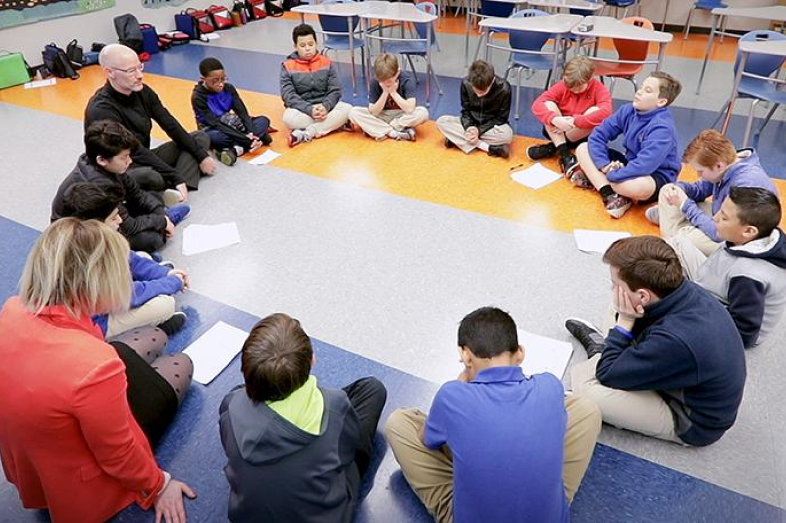
Educating for Character & Citizenship
Photo credit: Valor Collegiate Academies

Photo credit: Valor Collegiate Academies
The intensive focus in public schools on boosting achievement in core subjects has sparked concerns that the U.S. education system is neglecting an important responsibility: to help foster in children strong character and prepare them for active citizenship in a democratic society.
Yet some schools take an active role in educating the “whole child.” Arguably the biggest development in recent years has been a rising focus on social and emotional learning, to promote skills and attitudes such as grit, self-control, and a growth mindset. Another key domain is the formation of moral character — traits such as honesty, compassion, and responsibility.
And then come the civic virtues and dispositions that contribute to the common good. Some school initiatives aim to explicitly help young people learn — and experience — what it means to be active citizens in their community and beyond. It’s not simply a matter of voting, but taking other actions, such as creating more green spaces in low-income communities or volunteering at a local food bank.
When character education comes up, especially in a public school context, the topic raises many critical questions. What is the appropriate role for public schools in character formation? Whose values should they impart, especially in an increasingly diverse society? Is an emphasis on moral character or social and emotional learning (sometimes called performance character) an ill-conceived distraction from core academics? Is there really time for it?
Developing character through public schooling has a long and deep history in the United States, as Brookings Institution fellow Jon Valant and others note.
“Character education hasn’t received much attention during an era of education policy and rhetoric that almost exclusively targeted proficiency in core academic subjects,” Valant writes for The Brookings Institution. “The narrow focus of recent decades, however, is historically anomalous, and the country has regularly looked to schools to address threats it perceives to its social, economic, and political well-being.”
One issue that emerges when writing about educating for character is the terminology. A lot of different phrases are invoked, including character education, social and emotional learning, non-cognitive skills, moral education, etc. NPR education reporter Anya Kamenetz wrote a blog post about this very issue: Social and Emotional Skills: Everybody Loves Them But Still Can’t Define Them.
The Jubilee Center for Character & Virtues at the University of Birmingham in England recently published “A Framework for Character Education in Schools.” It offers a helpful primer and divides character into four categories:
To be meaningful, character education has to be part of the fabric of school life — not just an add-on or a once-a-week lesson, suggested several experts at an EWA seminar. And educators must practice what they preach.
Building character, community, and citizenship is an integral part of the Two Rivers Public Charter School in Washington, D.C., said Jessica Wodatch, the school’s executive director. She cited as examples regular morning meetings for all students, the emphasis on “scholarly habits” such as working hard, being a team player, and caring for the community, and embedding character and citizenship dimensions into 10-week academic exploration projects students tackle, called expeditions.
The push for social and emotional learning has gained widespread attention, fueled by a growing body of research that suggests a focus on this domain can improve academic achievement and success in life. As Education Week reports, the Aspen Institute National Commission on Social, Emotional and Academic Development has convened working groups and is visiting schools around the country that embrace social and emotional learning.
In early 2018, the commission issued preliminary findings. One was that “learning is social and emotional,” that social, emotional, cognitive, linguistic, and academic development are “deeply intertwined in the brain and in behavior,” and that “all are central to learning and success.” The report also concludes that many instructional strategies can support social and emotional development, but that they “must be implemented intentionally.” A third is that successful SEL should be reflected in all aspects of schooling, from classroom instruction to a school’s culture and climate and even family engagement.
Looking ahead, Education Week’s Evie Blad notes, “A common concern about social-emotional learning is that it will be another short-lived trend in a line of educational movements that schools try and abandon without giving it a chance to take effect in a meaningful way.”
The commission itself highlighted some of the challenges ahead, including determining the best ways to build the capacity of educators to support SEL, and figuring out how policy can encourage the integration of SEL into schools “without creating a mandate for compliance or dampening local efforts and enthusiasm.”
Another key question is how to best to measure social and emotional learning. Indeed, early speculation that some states would build SEL into their revamped accountability systems under the federal Every Student Succeeds Act have not come to pass. So far, no state is using such measures.
In the meantime, many experts and educators see a pressing need to engage more deliberately with questions of character and citizenship.
Ron Berger, the chief academic officer at EL Education and a longtime advocate of educating for character, argues that character can’t be ignored in schools. “Many districts or schools will say to me, ‘We don’t have time to teach character.’ My answer is always this: ‘You don’t have a choice to teach character: You’re doing it all day long.’ ”
For more information, check out our resources page on character and citizenship.
Your post will be on the website shortly.
We will get back to you shortly